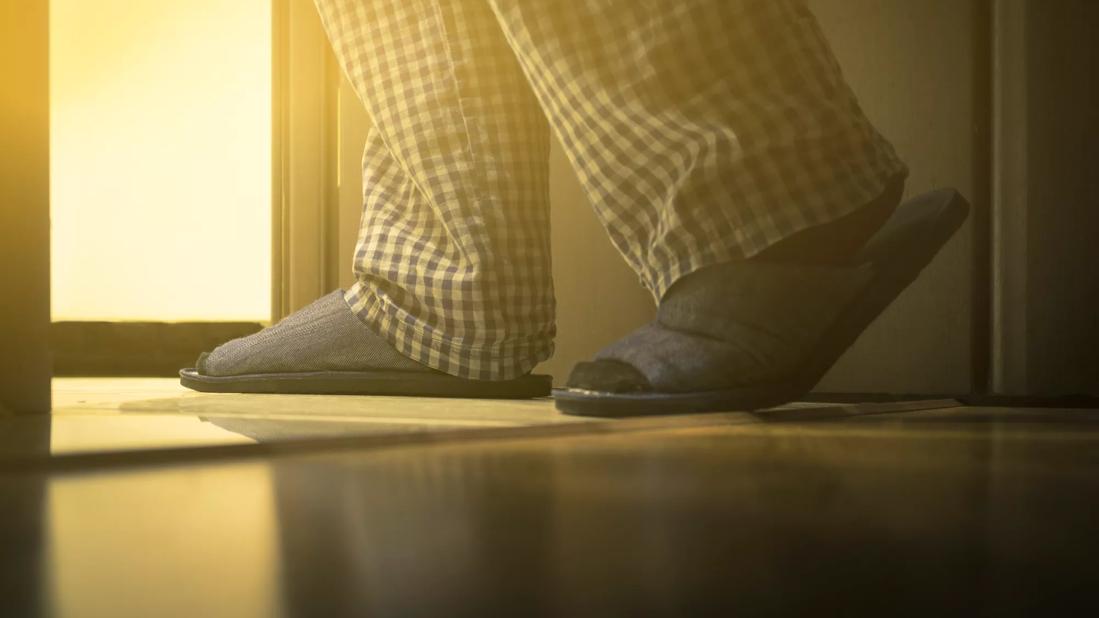How to minimize this nightly annoyance

You just want to get some sleep, but you can’t ignore that pressing urge to pee. You can’t hold it. You have to get up and go.
Advertisement
Cleveland Clinic is a non-profit academic medical center. Advertising on our site helps support our mission. We do not endorse non-Cleveland Clinic products or services. Policy
It happens to all men eventually. And it happens more frequently later in life.
“It’s normal for men as we age to get up to go,” says urologist James Ulchaker, MD. “In fact, it’s normal for a 60-year-old man to get up once, a 70-year-old man to get up twice and an 80-year-old man to get up three times a night.”
OK, so it’s common. But you can minimize this nightly annoyance.
Your body makes more urine in the evening than during the day, Dr. Ulchaker explains. In some individuals, the fluid you take in during the day pools into your lower extremities, and when you lie down, some of that fluid gets back into circulation.
“The heart and the kidneys recognize there’s extra fluid and that you need to get rid of it,” he says.
So how can you limit your nighttime bathroom visits? The obvious answer is to drink less later in the day. But Dr. Ulchaker also has more specific suggestions.
Caffeine is the No. 1 bladder irritant.
“Caffeine makes the bladder contract at lower volumes, which means you’re going to have more urgency and frequency,” Dr. Ulchaker says.
While most people drink coffee in the mornings, many enjoy a cup or two after dinner as well.
“There are a number of cafés that sell coffee well into the evening hours,” he says. “Limit your caffeine — including coffee, tea, iced tea and soda pops — in the evening so you’ll have to go less in the middle of the night.”
Advertisement
Consuming alcohol in the evening hours will create urgency to urinate more frequently.
“Alcohol stops the kidneys from being able to reabsorb water,” Dr. Ulchaker says. “When you consume alcohol, you make more urine and will have to pee that out as well. When you drink any alcohol in the evening before you go to bed, you’re going to be getting up to go.”
Certain medications may make you urinate more. If you’re waking up frequently to pee, ask your doctor about adjusting what drugs you take or when you take them.
For instance, you may want to avoid diuretics in the evening. They increase the amount of water and salt your body releases as urine, so it’s best to take them earlier in the day — as long as your doctor agrees.
An enlarged prostate can also cause you to have to pee more at night.
It can pinch your urethra closed, making it harder for you to completely empty your bladder. It can make you feel like you have to urinate all the time, Dr. Ulchaker says.
Talk to your doctor about medication or surgical treatment.
There are underlying medical issues that may make you urinate frequently.
Some men don’t empty their bladders completely. Your physician or a urologist can check whether your bladder is emptying and storing urine properly.
Call your physician if you notice:
In most cases, the easiest way to get a better night’s sleep is simply to consume less fluid during the evening.
“What goes in has to come out,” Dr. Ulchaker says. “Even if your bladder empties well, it doesn’t take long to fill back up and you will go frequently.”
Advertisement
Learn more about our editorial process.
Advertisement

Most recommended precautions center around minimizing bruising or swelling

Even one drink can have an impact on your cognitive function leading to slurred speech, blurred vision and impaired memory

Understand who may (and may not) benefit

Lorem ipsum dolor sit amet. Et odio Quis vel ipsam omnis eum alias deleniti et placeat impedit non voluptas galisum hic autem enim et cupiditate aliquid. Est beatae quidem non facilis autem ut commodi nisi aut tempore rerum et dolores voluptatem cum enim optio id sapiente quasi. Ad laboriosam officiis 33 cupiditate sequi ea voluptatum consectetur qui necessitatibus voluptate et quasi doloremque et facere explicabo quo explicabo officia

Seeking help through therapy can be an important step in improving your quality of life when you have UC

Type 2 diabetes isn’t inevitable with these dietary changes

Applying a hot or cold compress can help with pain